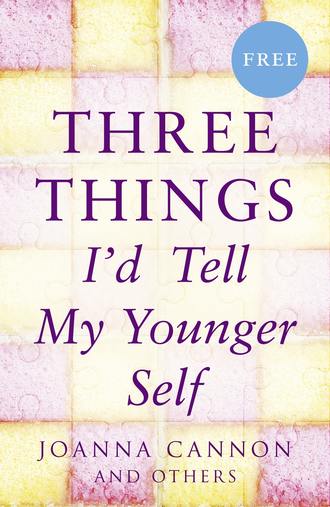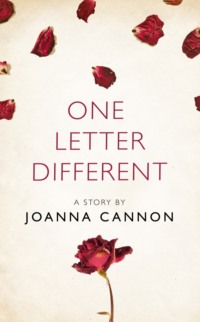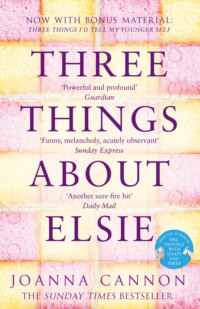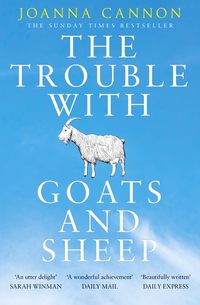
Полная версия
Three Things I’d Tell My Younger Self (E-Story)

THREE THINGS I’D TELL MY YOUNGER SELF
Joanna Cannon and others

Copyright
The Borough Press
An imprint of HarperCollinsPublishers Ltd
1 London Bridge Street
London SE1 9GF
www.harpercollins.co.uk
First published in Great Britain by HarperCollinsPublishers 2018
Copyright © Joanna Cannon; Ignasi Agell; Sue Armstrong; Hannah Beckerman; Ann Bissell; Dr Sue Black; Fern Britton; Wendy Burn; Janice Cannon; Tracy Chevalier; Julie Cohen; Charlotte Cray; Dr John Crichton; Miranda Dickinson; Suzie Dooré; Janet Ellis; Nathan Filer; Patrick Gale; Sam Guglani, Dr Helen-Ann Hartley; Kerry Hudson; Mandy Huxley; Reverend Andrea Jones; Adam Kay; Erin Kelly; Mr Kipling; Dr Kate Lovett; Katy Mahood; Anna Mazzola; Lydia Elise Millen; Dame Helena Morrissey; Hannah O’Brien; Femi Oyebode; Lev Parikian; Nina Pottell; Jonathan and Andrea Scott; Anita Sethi; Lionel Shriver; Graeme Simsion; Dr Laura Varnam; Professor Kate Williams 2018
Cover design: Holly Macdonald © HarperCollinsPublishers Ltd 2018
Cover photography © Shutterstock.com
The authors assert the moral right to be identified as the authors of this work.
A catalogue copy of this book is available from the British Library.
This book is a work of non-fiction based on the authors’ experiences.
All rights reserved under International and Pan-American Copyright Conventions. By payment of the required fees, you have been granted the non-exclusive, non-transferable right to access and read the text of this e-book on screen. No part of this text may be reproduced, transmitted, down-loaded, decompiled, reverse engineered, or stored in or introduced into any information storage and retrieval system, in any form or by any means, whether electronic or mechanical, now known or hereinafter invented, without the express written permission of HarperCollins.
Ebook Edition © AUGUST 2018 ISBN: 9780008318673
Version: 2018-11-12
Contents
Cover
Title Page
Copyright
Introduction
Ignasi Agell
Sue Armstrong
Hannah Beckerman
Ann Bissell
Dr Sue Black
Fern Britton
Wendy Burn
Joanna Cannon
Janice Cannon
Tracy Chevalier
Julie Cohen
Charlotte Cray
Dr John Crichton
Miranda Dickinson
Suzie Dooré
Janet Ellis
Nathan Filer
Patrick Gale
Sam Guglani
Dr Helen-Ann Hartley
Kerry Hudson
Mandy Huxley
Reverend Andrea Jones
Adam Kay
Erin Kelly
Mr Kipling
Dr Kate Lovett
Katy Mahood
Anna Mazzola
Lydia Ellise Millen
Dame Helena Morrissey
Hannah O’Brien
Femi Oyebode
Lev Parikian
Nina Pottell
Jonathan and Angela Scott
Anita Sethi
Lionel Shriver
Graeme Simsion
Dr Laura Varnam
Professor Kate Williams
Keep Reading …
About the Publisher
Introduction
As authors, I think we always write about the ideas that fascinate us, the unanswered questions, life’s small mysteries, and my second novel, Three Things About Elsie, explores something I’ve often thought about: how the smallest decisions can make the biggest difference to our lives – and the lives of those around us.
A postcard about a first aid course, pinned in a newsagent’s window, led me to a degree in medicine. A chance tweet about a mentoring programme for writers began my journey to becoming a published author. Seemingly small moments which, further down the road, turned out to be very big moments indeed.
These moments not only change the direction of our lives, they also have the ability to change our very sense of who we are. The postcard didn’t just eventually take me to medical school, it gave me a chance to try something I’d always thought I wasn’t smart enough to do. The tweet I saw travelling through my timeline didn’t hand me a publishing contract, it handed me an opportunity to gather a little of my self-belief. Small moments which allowed me to rewrite my own story.
No matter how often we change our stories though, our past self is always contained within our older self, and I wondered what advice I would give the younger version of me, if I could travel back in time. The girl collecting her A-level results. The girl who pined for a boy who didn’t pine for her. The girl who stared at a postcard in a newsagent’s window. What three things would I tell my younger self, if I had the chance? I decided to ask the same question to the wisest people I know – people from many different backgrounds, whose stories, lives and friendships continue to inspire me – and their answers to that question are contained within these pages. Some of the responses made me laugh out loud, some of them moved me to tears, and quite a few managed to do a little of both. Everyone very generously gave their time and their words for free, and we released this to coincide with exam results day (when everyone could do with more than a little moral support!)
I hope you find their advice as brilliant and inspirational as I do, and who knows, you may find a small moment of your own, hidden away within the pages of this book.
Thank you so much for reading!
Joanna Cannon
IGNASI AGELL, CONSULTANT PSYCHIATRIST
1. On many occasions I have struggled between the yes’s and the no’s, and not always remembered a lesson from the past; that renewing your dreams is renewing your sorrows. A battle between light and darkness. My young self, I would tell to be curious; to live in the light of the dreams, because in darkness we can’t see our shadows; to be authentic to overcome those shadows; and don’t be a prisoner of your own opinions.
2. I was born with a club foot, to parents that were both deaf. I was always surprised when others asked how it was for me to have a bad foot, or to live with deaf parents, as for me this was my normal, my baseline. Later in life, other things happened; better or worse, and I learnt never to be defined by them, even when they became significant elements of my chronological life. We all appear to look for certainties in life, when our secret lives are made of little things. My young self I would tell not to be afraid and to become a gatherer of little instants.
3. Finally, to be kind.
SUE ARMSTRONG, LITERARY AGENT, C+W AGENCY
1. Please don’t allow shyness to get in the way. You miss out on some incredible opportunities to meet iconic people and do once-in-a-life-time things all because you felt too shy to step forward. Put that feeling in a box and go forth and conquer!
2. That friend you adore? Keep him close. It may be an impossible situation but try to find a way, because 20 years later you’ll still miss him.
3. Tips for uni: Jacob’s Cream Crackers are not diet biscuits; DO NOT let that woman cut you a fringe; and remember night-time is for sleeping, daytime is for working, not the other way around (#Insomnia).
HANNAH BECKERMAN, AUTHOR and JOURNALIST
1. You’re not the only one who feels the way you do
Everyone around you seems so happy, content, confident. They seem comfortable in their own skin in a way you don’t. You imagine that you’re the only person in the world who feels unhappy, depressed, unsure of herself. Trust me: you are not. Some people are just better at hiding their insecurities than you are. And you’re so adept at hiding yours that many people look at you and have no idea how you’re really feeling. But in time, you are going to find people to trust with these feelings. And even though they may never disappear altogether, you’ll find that their power over you lose its hold once you dare to acknowledge them, articulate them, and share them.
2. Ditch the friends who make you feel rubbish
There’s always one (or two, or three). Those friends who make you feel like you’re not worthwhile. The ones who make you feel ugly, stupid, unlovable, unloved. They make comments that are supposed to be funny but are actually belittling. When you tell them something good that’s happened to you, they’ve always done something better. In groups, they talk over you, steal your punchlines, make you feel invisible.
Ditch these people from your life. They’re not friends. Your only purpose in their lives is to help smother their own insecurities. Your time – your value – is too great for that.
Seek out people who are genuinely happy for your successes. Who listen when you need to talk. Who care about who you are and how you feel.
And when you find those people, hold on to them, treasure them. Because they will be your friends for life.
PS: This goes for partners too. And family. Just because someone’s related to you by blood or marriage, doesn’t mean you have to tolerate nonsense from them. You don’t have to tolerate it from anyone.
3. The race is long and, in the end, it’s only with yourself (Mary Schmidt)
You look around you and everyone seems to be doing better than you. They’re getting better exam results (apparently with no revision whatsoever). They are prettier, thinner, more popular, more successful. They’re luckier than you: opportunities seem to fall into their lap. In time they will have jobs, homes, holidays that seem so much more impressive than yours. In comparison you feel less successful and, consequently, less happy.
Comparing yourself to other people will never make you happy.
Run your own race.
Don’t just look above you, at people achieving more than you. Look around you; at your peers, at those who are aspiring to do things you’re doing, and perhaps you’ll see that you’re not doing too badly after all.
The race is long and, in the end, it’s only with yourself. In years to come, you are going to have this pinned above the desk where you write every day: both as a reminder that you are doing the thing you love and therefore it’s immaterial what anyone else is doing; and as an acknowledgement that the only person who needs to be happy with the race you’re running is you.
ANN BISSELL, PUBLICITY DIRECTOR, COMMISSIONING, THE BOROUGH PRESS
1. Dear Bissell aged 17
Your mom tells you to play the game but you don’t understand why you should. So you are angry and disruptive and asked to leave school. You will still get your grades but why make life so difficult for yourself? Later, little one, you will discover that playing the game means challenging from within.
2. Dear Bissell aged 29
Oh you poor broken-hearted thing, putting all that love in the wrong place. You can’t change people. This is a lesson you will have to learn over and over again.
3. Dear Bissell aged 35
A tough year for you. But you will dig deep and you will be very proud of yourself. Being with someone at the end of their life will change yours. You will learn that you are strong and kind and much loved, and that your family are the best people in the world.
DR SUE BLACK, author of SAVING BLETCHLEY PARK
Dear Sue
I’m writing this as a 56-year-old woman with four fab children, and almost three lovely grandchildren (number three is due in a few weeks’ time). I’ve had an ‘interesting’ life, many ups and downs. My mum died when I was 12. That was really awful. My dad remarried and then I couldn’t wait to leave home, I wasn’t happy. I couldn’t be myself. I left home at 16. I had five O levels (old-fashioned GCSEs) and tried to stay on to do my A levels but it was too hard – I was working evenings and weekends to pay rent. I left school after two terms of A levels and got a job working for the local council. I hated it. It was a lot of filing, putting cardboard files in alphabetical order. I used to joke that I could have done that job before I went to school when I was four, because I could read then and knew my alphabet.
When I was 17 I got a job working in London with refugees from Vietnam. I loved it! I used to look after little kids all day and hang out with the teenagers in the evening. It was such fun. I learnt basic Vietnamese. When that place closed I moved to another centre for refugees. I took people to the doctor and dentist when they arrived in the UK. I spent my 18th birthday there.
I decided I needed a career. Nursing was the only thing I could think of – both my parents were nurses. I started the course, and hated it. Somehow I stuck it out for a year, I think mainly because I didn’t know what else to do. Eventually I left. I got a job working for a record company, in the accounts department. I loved and still love maths.
At 20 I got married and then had three children in just over two years. I had my daughter Emma and then twin boys, Samuel and Oliver. They were gorgeous and still are.
After that my marriage broke down. We lived in a women’s refuge for six months, then started life again in another part of London. It was hard but we did it. We lived on benefits for a while, then I started studying. I went to college, then uni. I did a degree, then a PhD. Then I became a lecturer, a senior lecturer, then a head of department.
I’m now an Honorary Professor of Computer Science at UCL in London. I give talks all around the world. Last year I spoke to an audience of 16,000 people at a conference for women in tech in Florida. I also teach mums tech skills with an awesome team of people. I’m writing my second book and enjoying my life. I am living the dream.
I have things I never imagined I would have: four wonderful children, two grandchildren, a house, lots of friends, respect from so many people.
I changed my world by focusing on what I wanted from life. I’ve had many challenges in my life – we all have lots of challenges in life. I wish I had been told that this was normal when I was younger.
I wanted to share my life story with you, to let you know that things will be OK when you get older. I’ve had loads of challenges since I was your age, so many things have gone wrong, but I’ve managed to turn the bad times into good. I also wanted to share three pieces of advice which I wish someone had given me when I was younger:
1. Keep going through the bad times. Shit happens. Bad things happen to people all the time. Don’t let difficult times stop you from getting where you want to go.
2. Surround yourself with supporters. Life is tough enough without listening to the haters. Build a network of supportive, good friends and support them back.
3. Don’t worry so much. Keep going and things will work out. Don’t spend lots of time worrying about ‘what ifs’. A bit of worrying is good to get you focused, but don’t let it get the better of you. Life is for enjoying, being happy. Work towards being happy and you will make everyone around you happy too.
You’ve got a great life ahead of you – some difficult times, but also lots of really amazing times. Times when you will be so happy, you want to shout and scream at how wonderful life is.
OK, time to go. Close your eyes. Can you feel it? I’m giving you a big hug and will now be holding your hand every step of the way. Have a great life.
Lots of love
Sue xxx
FERN BRITTON, author of COMING HOME
1. Don’t be afraid of change or failure. Take a leap of faith. Ditch the things that are negative in life and embrace the next challenge. It will all work out.
2. Try to take all serious competition out of your life. This might sound counter-intuitive, but imagine two drivers next to each other at the lights. As soon as they go red the foot goes down, common sense leaves the brain and the speed camera flashes, losing both of you your licences. Compete only with yourself. Make yourself the better you.
3. Count your blessings. There will always be people better off or worse off than you. Recognise all the goodness in your life. These things are health, love, and life.
WENDY BURN, PRESIDENT OF THE ROYAL COLLEGE OF PSYCHIATRISTS
1. As one door closes another one opens. You may think you have missed an opportunity, but another will come along, and sometimes it will be better than the one you missed.
2. When you are at rock bottom the only way is up.
3. There is always more than one pathway to happiness. Never think there is only one career, one partner or one life that will make you happy.
JOANNA CANNON, author of THREE THINGS ABOUT ELSIE
1. You actually do like popcorn, but (like many other things in life) you made up your mind before you’d even tried it. It’s worth giving something a go before you decide you don’t like it, can’t do it, or it isn’t for you. Because sometimes, you might find that it is. If nothing else, think of all the popcorn you’ll miss out on …
2. Concentrate on the things you can change. Very often, the only thing under your control is your reaction to something. Don’t stub your toe against a table and get angry with the table. There are an awful lot of tables out there (trust me), and you’re going to waste so much energy if you don’t master this one.
3. Being the odd one out is not a bad thing. It might feel a bit rubbish now, being the kid at the edge of the playground, not knowing how to join in. I know you spend a lot of time hidden away in your library books and wandering around in your own imagination, but this is all going to work out just fine. You’ll see.
JANICE CANNON, JOANNA CANNON’S MUM
1. Don’t follow the crowd. Play your own game. Just because everyone else is doing something, it doesn’t mean it’s the right thing to do. It might feel safer to copy other people, but the safest option in life is to always be yourself.
2. Always take a chance, and the chances you’re offered. Many things in life are a risk, but if you hold on to your nerve and your self-belief, you will never regret giving something a try.
3. The most important goal in life is to be happy, and happiness can be found in the unlikeliest of places. Never forget to look up – you might be surprised at what you see.
TRACY CHEVALIER, author of GIRL WITH A PEARL EARRING
1. In adult life, no one ever asks you what grades you got. No one cares, they just want to know that you graduated. So stop worrying about getting a B– rather than a B+.
2. A career path is rarely straight and planned out. You get to what you want to do through accidents, through exploring cul-de-sacs, through surprise encounters. Most people radically change careers two or three times in their lives. Go with the flow and experiment.
3. Don’t judge a person by their surface. You would be amazed at what is going on underneath. Many years after finishing school, I met one of the ‘popular’ girls from my year and discovered what a misery her life had been as a teenager. I would never have guessed at the time; if I had known, I might have been less judgemental, and less intimidated.
JULIE COHEN, author of TOGETHER
Dear teenage Julie,
I see you there, 80s girl, with your pink hair and your man’s suit jacket with the rolled-up sleeves and your FRANKIE SAY RELAX T-shirt. You are pretty awesome, you know. I wish I still had your hips and your skin and your singing voice. But I’ve learned a few things since I was you. Here are three of them.
1. You don’t have to be perfect
Right now you’re top of your class in your little Maine high school. You have the best grades, you’re the lead in all your school plays, you have great friends, you’re popular (at least with the weird kids). But in a couple of years, you’re going to go to a huge, exclusive university, and you’re not going to be the smartest kid in the room any more. You’ll get scared of trying new things. You won’t try out for any plays or any singing groups. You’ll shy away from joining clubs, or doing any art. You’ll be afraid of failing, or of not being the best.
Конец ознакомительного фрагмента.
Текст предоставлен ООО «ЛитРес».
Прочитайте эту книгу целиком, купив полную легальную версию на ЛитРес.
Безопасно оплатить книгу можно банковской картой Visa, MasterCard, Maestro, со счета мобильного телефона, с платежного терминала, в салоне МТС или Связной, через PayPal, WebMoney, Яндекс.Деньги, QIWI Кошелек, бонусными картами или другим удобным Вам способом.





